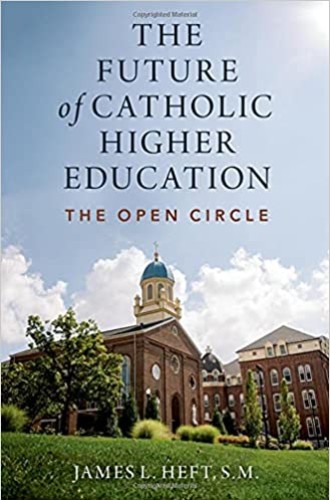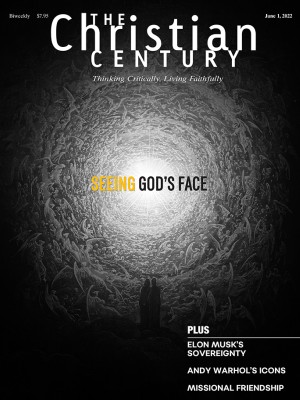Does Catholic higher ed have to sell its soul?
A truly Catholic university, says James Heft, steers a course between secularization and insularity.
During the years that radicals suppressed France’s 22 universities after the French Revolution, America’s first Catholic university began operations. Georgetown University, which was shielded from government meddling by the US Constitution’s First Amendment, began teaching its first students in 1792.
To accommodate waves of Catholic immigrants in the 19th century, intrepid monks and missionaries went on to found many more schools: Saint Louis University in 1818, Fordham in 1841, Villanova and Notre Dame in 1842, Holy Cross in 1843, Boston College in 1863, DePaul in 1898. Today, some 200 Catholic institutions of higher learning exist in the United States, making up 20 percent of such schools worldwide despite the fact that American Catholics represent only a small subset of global Catholicism.
Read our latest issue or browse back issues.
These Catholic schools exist in an ecosystem with other private, church-related institutions from other traditions, ranging from research universities to small liberal arts colleges. Together, these schools constitute an extraordinary legacy of religious commitment and entrepreneurial zeal in a new, expanding country. Their origins provide a stark contrast to much of postrevolutionary Europe, where centralized states agglomerated higher education under their auspices, often forcing religious thought into seminaries and to the margins of society.
Anyone who cares about this ecosystem and especially its Catholic dimension will benefit from James Heft’s fine volume. Having served as a professor and administrator at several Catholic institutions and as founding director of the Institute for Advanced Catholic Studies at the University of Southern California, Heft brings theoretical depth and practical experience to his analysis. He advises universities to steer a middle ground between sectarian insularity and self-defeating secularization.
Sectarian religious schools, Heft contends, err with a “closed-circle” approach, untowardly shielding their students from the rough-and-tumble of intellectual pluralism and cutting-edge science. He names not only some evangelical schools but also several Catholic schools, such as Franciscan University of Steubenville in Ohio, Ave Maria University in Florida, and Thomas Aquinas College in California.
Yet more-established Catholic universities have often erred in the opposite direction, Heft writes. They obsequiously imitate prestigious secular schools, paying with their souls to play in higher ed’s big leagues. Arguably, many Catholic schools inclined in this direction upon signing the Land O’Lakes Statement in 1967, a pivotal document that called for “true autonomy and academic freedom in the face of authority of whatever kind, lay or clerical, external to the academic community itself.” This leaves open the fraught question—debated endlessly on many campuses—of the nature of a Catholic university’s relationship with the Catholic Church.
With this question hovering over the book, Heft proposes what he calls an “open circle” Catholic university, one that is faithful to its founding religious roots but robustly engaged with serious, diverse intellectual life. Drawing often from Pope John Paul II and 19th-century Catholic convert John Henry Newman, among many others, Heft argues that a true Catholic university “is neither secular nor sectarian. It is not secular because it affirms the importance of the religious realm as an area of scholarship. It is not sectarian because an integral part of being Catholic is seeking truth wherever it can be found.”
But strategic hiring is key, Heft argues, and he intimates that for too long some top-notch Catholic schools neglected hiring for mission. In seeking diversity within a particular university, they diminished diversity among universities—turning once-robust Catholic institutions into paler imitations of other, often more prestigious schools. Even so, a serious Catholic university need not hire Catholics exclusively, says Heft, arguing that they should also hire others who are willing to engage, even if at times critically, with a distinctively Catholic intellectual environment.
The disciplines of theology and philosophy are paramount in Heft’s analysis. They keep alive the big questions that enliven and bring meaning to human existence and, if curated by witless administrators, easily fall prey to more urgent and trendier preoccupations in higher ed. At their best, these disciplines can awaken in students an “astonishing awareness” (a term borrowed from theologian John Cavadini) about our world and about the same faith that informs Dante’s Comedia and Pope Francis’s concern for the plight of refugees today.
A single book cannot do all things, and Heft passes over some key issues confronting universities: soaring tuition, administrative bloat, professionalism’s vanquishing of the liberal arts ideal, and a progressivist groupthink that has veered on some campuses into rank illiberalism.
Nevertheless, Heft is spot-on in suggesting that the Catholic intellectual tradition, though always a work in progress and not immune to dead ends, possesses moral resources that might well serve the academy at large.
He emphasizes intellectual humility, a virtue that he draws from medieval theologian Nicholas of Cusa’s notion of “learned ignorance” (docta ignorantia), a sober awareness of what we do not know that comes, paradoxically, only with deep learning. The church’s teaching on the inviolable dignity of every human person, furthermore, should remind us all that “students are not primarily customers nor faculty solely experts. They are [first] persons working together in a learning community that seeks not just knowledge but also wisdom.”
Intellectual humility and the pursuit of wisdom might sound out of place in today’s fluid and fast-paced educational environment, and Heft would be the first to admit that neither the Catholic Church nor Catholic universities embodies them perfectly or even well. Even so, in a world where arrogance and ignorance are often on garish display, the antidotes that Heft proposes merit a serious hearing, whether one is religious or not. And who knows? Perhaps the school willing to claim them unapologetically has found a pearl of great price, possibly even a lamp to guide the path of others.






